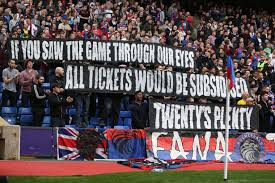By David Owen
November 30 – It looks increasingly likely that matchday revenues generated by Premier League clubs will be found to have fallen in 2014-15. With six English top-tier clubs having already reported, cumulative matchday revenue from all competitions is showing 6% down at just over £290 million.
While this data is drawn from fewer than a third of the 20 Premier League clubs, the six accounted for 44% of overall 2013-14 league revenues. Chelsea, moreover, have stated that matchday revenues last season were “largely unchanged” from 2013-14’s £71 million. Add the West Londoners to the figures already confirmed and these seven clubs were responsible for 53.7% of 2013-14 revenues.
The downwards trend seems to be the result of two main factors: pressure on clubs to keep the lid on prices – and grounds full – in a period when many supporters have been suffering a prolonged squeeze on their living standards; Manchester United’s failure to qualify for European competition in 2014-15.
The trend will no doubt be welcomed by supporters’ groups, who often point to lower ticket prices in countries such as Germany in an effort to encourage English clubs to follow suit.
Longer term, however, the diminishing importance of matchday income in Premier League clubs’ overall finances may encourage developments, such as ever more varied kick-off times, that are unlikely to please local fans.
According to Deloitte, the £616 million of matchday revenue generated by Premier League clubs in 2013-14 “for the first time in the history of the league made up less than one-fifth of total revenue”.
This proportion looks set to edge down fractionally in 2014-15. It is from 2016-17 – with a new, massively increased domestic broadcast deal already in the bag – that matchday revenue as a percentage of the total will once again lurch lower, you might almost argue to the point of insignificance.
It is true that local fans contribute to other revenue streams such as merchandising and broadcasting rights income. No-one, moreover, will want matches taking place in half-empty stadia, although you could argue that fans are being edged towards the sort of role played by extras in a Hollywood blockbuster.
With international broadcasting rights also manifesting impressive growth, not least in Asia, it is hard not to conclude that we may be heading for an era of more frequent early kick-off times. “In Asia, you shouldn’t have to watch our great games at 3am,” La Liga President Javier Tebas observed recently.
Having arrived late at the international broadcast rights party because of Spain’s late adoption of a collective selling model, the league in which world football’s biggest stars Lionel Messi and Cristiano Ronaldo currently ply their glittering trades is trying to make up for lost time by, for example, sometimes now staging matches in 10 different time-slots over the weekend.
The question is, with fans based thousands of miles away, in effect, contributing an ever higher proportion of the top European clubs’ revenue, will the Spanish league’s main competitors feel driven, sooner or later, to follow suit?
Contact the writer of this story at moc.l1734956288labto1734956288ofdlr1734956288owedi1734956288sni@n1734956288ewo.d1734956288ivad1734956288

